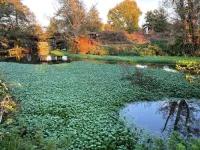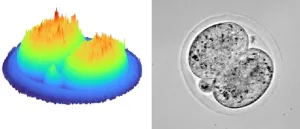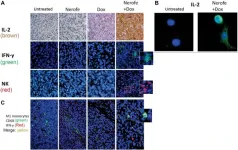(Press-News.org) CABI scientists have carried out a study which reveals invasive non-native species (INNS) – such as the aquatic water weeds floating pennywort and Japanese knotweed as well as signal crayfish – cost the UK economy an estimated £4bn a year.
However, when species only covered by the GB Non-native Species Strategy are considered – for instance with fungi excluded from the estimate – the total cost was estimated to be £1.9bn.
Researchers working from CABI’s centres in Egham, UK, as well as Switzerland and Kenya, found a 135% increase in comparable costs since the last assessment was conducted in 2010. Annual estimated costs in 2021 were £3.02bn, £499m, £343m and £150m to England, Scotland, Wales and Northern Ireland respectively.
The cost to forestry increased eightfold, the cost to aquaculture and agriculture increased by 139.5% and 112.7%, respectively, and the cost of most of the other sectors increased roughly in line with inflation (47.6% for GB and 55.7% for Northern Ireland).
Agriculture is the industry affected the most with estimated costs for the UK put at £1.088bn followed by construction, development and infrastructure at £270m and tourism and recreation at £136m. The impact upon forestry is £123m.
The study, published in the journal Biological Invasions, updates the earlier assessment using the same methodology and the diversity of changes among sectors and species highlights the value of such a detailed approach.
There are currently around 2,000 INNS in the UK with 10-12 new species establishing themselves every year. The list includes well-known established species such as grey squirrel, killer shrimp, giant hogweed, mink and parakeets, as well as recently arrived, but highly impactful species such as the sea squirt Didemnum vexillum and ash dieback.
The fungus Hymenoscyphus fraxineus, which causes ash dieback disease has become the costliest species in the past decade in the UK at an estimated £883.5m followed by followed by Japanese knotweed (£246.5m), rabbits (£169.7m), rats and mice (£84.4m), cockroaches (£69.8m) and deer (£62.9m).
As a group, fungi were the costliest to the UK, accounting for 52.9% of the total estimated costs, followed by mammals, plants and terrestrial arthropods (21.9%, 15.5% and 7.5% of the total, respectively).
Dr Rene Eschen, lead author and Senior Scientist, Ecosystems Management, said, “Our research illustrates the usefulness of repeating economic cost assessments for INNS, as INNS are dynamic and their impacts vary.
“Repeat assessments like this one are important to maintain a focus on the impact of INNS, changes in impacts as a result of new or spreading species, as well as the identification of potential impacts of management or policies.”
The researchers recommend continued investment in sustainable, long-term solutions for widespread damaging species, such as classical biological control, which, they say, has been shown worldwide to be a cost-effective, safe and environmentally sensitive management option when other methods prove ineffective or are no longer feasible.
Dr Richard Shaw, co-author and Senior Regional Director, Europe and The Americas, said, “This assessment again shows the important costs of INNS to the UK economy. Few effects of INNS specific management efforts can be seen in these results. However, they highlight the need to continue prevention and early detection, followed by eradication of the highest-risk species prior to establishment.”
In February, the GB Invasive Non-native Species Strategy, which draws upon CABI’s research, was published to provide a strategic framework within which the actions of government departments, their related bodies and key stakeholders can be better co-ordinated.
Defra Head of GB Non-Native Secretariat, Niall Moore, said: “Invasive Non-Native species pose a serious threat to our natural environment and this Government is taking action through the recently launched GB Invasive Non-Native Species strategy, to protect our native animals and plants from INNS.
“CABI’s research, funded by Defra, reveals the significant financial impact of INNS. It is vital that we work together with researchers, scientists, and others, who are working to tackle INNS, to prevent their entry into and establishment in Great Britain and, when they do become established, to mitigate their negative impacts.”
Additional information
Main image: Floating pennywort is one invasive non-native species of concern. The aquatic weed causes dense mats that cover the water’s surface – such as here on this water course on the River Wey, Weybridge, UK (Credit: Djami Djeddour).
Full paper reference
René Eschen, Mariam Kadzamira, Sonja Stutz, Adewale Ogunmodede, Djami Djeddour, Richard Shaw, Corin Pratt, Sonal Varia, Kate Constantine and Frances Williams, ‘An updated assessment of the direct costs of invasive non-native species to the United Kingdom,’ 6 July 2023, Biological Invasions, DOI: 10.1007/s10530-023-03107-2
The paper can be read in full open access from 1am UK Time 6 July 2022 here: https://link.springer.com/article/10.1007/s10530-023-03107-2
Acknowledgement
This work was funded by the UK Department for Environment Food and Rural Affairs (Defra) under contract #34247. CABI is an international intergovernmental organisation, and we gratefully acknowledge the core financial support from our member countries (and lead agencies) including the United Kingdom (Foreign, Commonwealth & Development Office), China (Chinese Ministry of Agriculture and Rural Affairs), Australia (Australian Centre for International Agricultural Research), Canada (Agriculture and Agri-Food Canada), Netherlands (Directorate-General for International Cooperation), and Switzerland (Swiss Agency for Development and Cooperation). See https://www.cabi.org/about-cabi/who-we-work-with/key-donors/ for full details.
END
Invasive non-native species cost UK economy an estimated £4bn a year, new CABI-led study reveals
CABI scientists have carried out a study which reveals invasive non-native species (INNS) – such as the aquatic water weeds floating pennywort and Japanese knotweed as well as signal crayfish – cost the UK economy an estimated £4bn a year.
2023-07-06
ELSE PRESS RELEASES FROM THIS DATE:
Empowering vulnerable communities in the face of growing natural threats
2023-07-06
Heavy wildfire smoke drifting from Canada to U.S. cities hundreds of miles away is a stark reminder that no community is immune from climate change-fueled hazards. A Stanford-led study published recently in Environmental Research Letters provides a blueprint for empowering people in frontline communities – those that experience the “first and worst” consequences of climate change – to better understand and deal with wildfire smoke, extreme heat, and other hazards.
The research – done in four predominantly low-income, ...
Fewer than half of new drugs add substantial therapeutic value over existing treatments
2023-07-06
New drugs are often used not only for one disease (first approved indication) but also for other diseases (supplemental indications).
But a study published by The BMJ today finds that less than half of approved first indications for new drugs in the US and Europe between 2011 and 2020 add substantial therapeutic value over existing treatments and only around a third of supplemental approvals add substantial therapeutic value compared with first approvals.
The researchers argue that when first or supplemental indications do not offer added benefit over existing treatments, this information should be clearly communicated to patients and reflected in the price of ...
Lack of sleep lessens cognitive benefits of physical activity
2023-07-06
Lack of sleep lessens cognitive benefits of physical activity
Regular physical activity may protect against cognitive decline as we get older, but this protective effect may be diminished for people who are not getting enough sleep, according to a new study by UCL researchers.
The study, published in The Lancet Healthy Longevity, looked at cognitive function over 10 years in 8,958 people aged 50 and over in England. The research team investigated how different combinations of sleep and physical activity habits might affect people’s cognitive function over time.
They found that people who were more physically ...
Amsterdam UMC led eHealth app ensures 30% faster recovery after major abdominal operations
2023-07-06
Through the use of eHealth application ikHerstel, patients recover from major abdominal operations 30% faster than patients who do not use the app. That is the main conclusion of research led by Amsterdam UMC across eleven Dutch hospitals. The app aims to empower patients to feel more in control of their recovery process. The results were published today in Lancet Digital Health.
Patients are being discharged from the hospital quicker after treatment. Where patients used to receive care, information and support in the hospital for a number of days, they are now often ...
Holograms for life: Improving IVF success
2023-07-06
In a world-first, 3D holographic images of an embryo have been developed as part of a collaborative research project between the University of Adelaide and University of St Andrews. The images are created using miniscule amounts of light in a fraction of a second.
The team, led by Dr Kylie Dunning, Hospital Research Foundation fellow from the University of Adelaide’s Robinson Research Institute, and Professor Kishan Dholakia from the University of Adelaide and the University of St Andrews, developed an approach to create 3D holographic images of the pre-clinical model of an embryo at various stages ...
Helping adolescents to feel competent and purposeful – not just happy – may improve grades
2023-07-06
Encouraging adolescents to feel capable and purposeful – rather than just happy – could improve their academic results as well as their mental health, according to new research which recommends changing how wellbeing is supported in schools.
The University of Cambridge study, involving over 600 teenagers from seven English schools, examined two separate aspects of their wellbeing: life satisfaction and ‘eudaimonia’. While life satisfaction roughly equates to how happy a person is, eudaimonia refers to how well that person feels they are functioning. It incorporates feelings of competence, motivation and self-esteem.
Researchers ...
Unlocking the mystery of long-lasting cancer treatment
2023-07-06
New insights explaining why some children have a longer remission than others after having cutting-edge CAR T-cell therapy for leukaemia have been revealed by researchers at UCL, Great Ormond Street Hospital, and the Wellcome Sanger Institute.
The collaborative research project, published today in Nature Medicine, combines expertise in novel immune therapy design and state-of-the-art computational analysis to identify a genetic signature of CAR T-cells that will be the most effective in the long term.
In recent years, CAR T-cells – genetically engineered ...
Astronomers identify the earliest strands of the cosmic web
2023-07-06
Using NASA's James Webb Space Telescope, a team of scientists led by University of Arizona astronomers has discovered a threadlike arrangement of 10 galaxies that existed just 830 million years after the Big Bang.
Lined up like pearls on an invisible string, the 3-million-light-year-long structure is anchored by a luminous quasar – a galaxy with an active, supermassive black hole at its core. The team believes the filament will eventually evolve into a massive cluster of galaxies, much like the well-known Coma Cluster in the "nearby" universe. The results are published in two papers in The Astrophysical Journal ...
Professor spreads the gospel of ‘good fire’ through eco-cultural lens
2023-07-06
LAWRENCE – A pyromaniac is someone unhealthily obsessed with the destructive power of fire. Melinda Adams instead is pulled toward the term pyromantic – a lover of “good fire” for the benefits it can bring to people, communities and the environment as a whole.
The Langston Hughes Assistant Professor in Indigenous Studies and Geography & Atmospheric Science at the University of Kansas, Adams extols the benefits of cultural or ceremonial fire in a new paper she has co-authored ...
Transformation of immunosuppressive mtKRAS tumors into immunostimulatory tumors by Nerofe and Doxorubicin
2023-07-05
“[...] we demonstrated that the combination of Nerofe and DOX exerts a synergistic effect during mCRC treatment [...]”
BUFFALO, NY- July 5, 2023 – A new research paper was published in Oncotarget's Volume 14 on July 1, 2023, entitled, “Transformation of immunosuppressive mtKRAS tumors into immunostimulatory tumors by Nerofe and Doxorubicin.”
Members of the rat sarcoma viral oncogene (RAS) subfamily KRAS are frequently mutated oncogenes in human cancers and have been identified ...
LAST 30 PRESS RELEASES:
Magnetic resonance imaging opens the door to better treatments for underdiagnosed atypical Parkinsonisms
National poll finds gaps in community preparedness for teen cardiac emergencies
One strategy to block both drug-resistant bacteria and influenza: new broad-spectrum infection prevention approach validated
Survey: 3 in 4 skip physical therapy homework, stunting progress
College students who spend hours on social media are more likely to be lonely – national US study
Evidence behind intermittent fasting for weight loss fails to match hype
How AI tools like DeepSeek are transforming emotional and mental health care of Chinese youth
Study finds link between sugary drinks and anxiety in young people
Scientists show how to predict world’s deadly scorpion hotspots
ASU researchers to lead AAAS panel on water insecurity in the United States
ASU professor Anne Stone to present at AAAS Conference in Phoenix on ancient origins of modern disease
Proposals for exploring viruses and skin as the next experimental quantum frontiers share US$30,000 science award
ASU researchers showcase scalable tech solutions for older adults living alone with cognitive decline at AAAS 2026
Scientists identify smooth regional trends in fruit fly survival strategies
Antipathy toward snakes? Your parents likely talked you into that at an early age
Sylvester Cancer Tip Sheet for Feb. 2026
Online exposure to medical misinformation concentrated among older adults
Telehealth improves access to genetic services for adult survivors of childhood cancers
Outdated mortality benchmarks risk missing early signs of famine and delay recognizing mass starvation
Newly discovered bacterium converts carbon dioxide into chemicals using electricity
Flipping and reversing mini-proteins could improve disease treatment
Scientists reveal major hidden source of atmospheric nitrogen pollution in fragile lake basin
Biochar emerges as a powerful tool for soil carbon neutrality and climate mitigation
Tiny cell messengers show big promise for safer protein and gene delivery
AMS releases statement regarding the decision to rescind EPA’s 2009 Endangerment Finding
Parents’ alcohol and drug use influences their children’s consumption, research shows
Modular assembly of chiral nitrogen-bridged rings achieved by palladium-catalyzed diastereoselective and enantioselective cascade cyclization reactions
Promoting civic engagement
AMS Science Preview: Hurricane slowdown, school snow days
Deforestation in the Amazon raises the surface temperature by 3 °C during the dry season
[Press-News.org] Invasive non-native species cost UK economy an estimated £4bn a year, new CABI-led study revealsCABI scientists have carried out a study which reveals invasive non-native species (INNS) – such as the aquatic water weeds floating pennywort and Japanese knotweed as well as signal crayfish – cost the UK economy an estimated £4bn a year.





